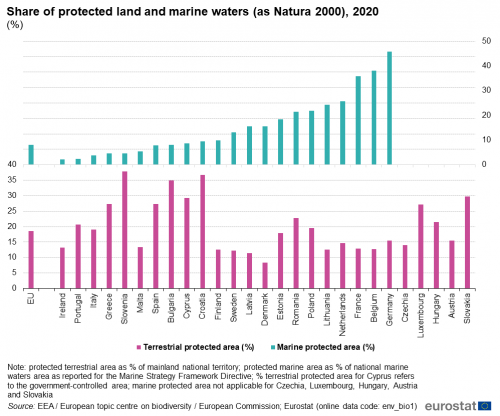Wednesday marked a groundbreaking moment as the European Parliament passed the ambitious EU Nature Restoration Law. The law’s passage marks a significant milestone in safeguarding our planet’s environment for future generations.
Surviving The Knife-Edge Vote
On Wednesday, a vote occurred regarding the revised law regarding the revised EU Nature Restoration Law. Following a tight race, there were 336 votes in favour, 300 against, and 13 abstentions. Before the vote, a motion to reject the entire legislation had also failed to gain enough support for passing.
The result of the dramatic nature restoration vote, which prompted loud applause from the progressive MEPs, signaled a triumph in fighting climate change. The vote prompted loud applause from the progressive MEPs and signified a triumph for environmental conservation. Despite the stiff opposition, the law emerged stronger, encompassing ecological and economic considerations.
Before the vote, several EPP members including Ireland’s Frances Fitzgerald broke ranks to support the bill.
“I cannot in good conscience and good faith vote against this law,” Fitzgerald said in a video on Twitter. “We need to protect biodiversity. We need this law to protect our citizens, our businesses, and, above all, the future generations,” she added.
Nature Restoration Law: A Turning Point for Biodiversity Preservation
The EU Nature Restoration Law is a comprehensive proposal that outlines Europe’s restoration goals. The law includes binding targets to rehabilitate at least 20% of Europe’s degraded ecosystems by 2030. This regulation provides a framework for managing restoration efforts and establishes binding targets in various areas, such as farmlands, peatlands, and marine ecosystems, and reverses the damage inflicted by human activity and climate change. Moreover, the law is in conjunction with the United Nations’ Sustainable Development Goals.

The EU Nature Restoration Law prioritises biodiversity preservation and restoring degraded natural habitats, laying the foundations for a sustainable future. By implementing restoration measures, Europe hopes to mitigate the effects of human activity and restore balance to the natural habitats. In June 2022, the European Commission presented the law, which gained significance following COP15’s landmark biodiversity deal in December. In 2021, 81% of EU ecosystems were deemed “poor” or “bad” by the European Environment Agency and Greenpeace.
Overcoming Right-Wing Opposition: A Triumph for Environmental Conservation
There has been a heated debate and opposition campaign surrounding the nature restoration law in the past few months, which scientists criticised as misleading. The European People’s Party (EPP), the largest formation in parliament, has been the main opposition. The EPP claimed that the current law would jeopardise the livelihoods of European farmers and fishers, disrupt established supply chains, reduce food production, increase consumer prices, and even replace urban areas with green spaces.
“Less land for farmers, less sea for fishermen, less activity for businesses, and fewer European products and jobs for our citizens,” said Rosanna Conte, an Italian MEP from the Identity and Democracy group, during a heated debate on Tuesday.
Despite fierce opposition, scientists remained steadfast in refuting the idea that nature restoration had adverse effects on food production and the economy. In an open letter signed by 6000 scientists, it was stated that such claims “not only lack scientific evidence but even contradict it.” They point to studies demonstrating that the restoration of nature would enhance food security, strengthen fisheries, generate employment opportunities, and save money. They have remained adamant that by restoring ecosystems, Europe can promote sustainable agriculture, mitigate the risk of natural disasters, improve natural resource management, and support local communities.
Those in favour of the proposal have also pointed to how it sets the stage for widespread action to restore ecosystems in need on both land and sea. Supporters such as Virginijus Sinkevicius claim that European countries can ensure their national restoration plans whilst ensuring food security as the benefits for farmers will be many. This approach recognises a dedication to restoring Europe’s nature by 2050.

Building a Sustainable Future: Collaboration and Implementation
The EU Nature Restoration Law serves as a rallying call for international collaboration and concerted action. While some celebrate the victory, supported by companies like Nestle and Danone, others view Wednesday’s vote as a hollow triumph for left-wing parties.
MEPs substantially weakened the original proposal of the commission. For instance, the European Parliament eliminated requirements for agricultural land that involved the restoration of peatlands. Manfred Weber, chairman of the EPP group, has already expressed his intention to bring new elements to the negotiating table. These include elements such as an emergency break in case food prices shoot up.
Balancing Economic and Environmental Interests thanks to the Nature Restoration Law
Despite tireless opposition, balancing economic and environmental interests is vital for the legislation’s success. The real work, however, lies in the implementation of the law’s provisions. Active participation from policymakers, scientists, and communities will also be crucial in achieving ensuring ecosystems and food security
Wednesday’s vote, although a slim victory, marks a step in the right direction for preventing biodiversity loss. Had the vote not passed, those who opposed the rejection would have sent the text back to the commission. The passage of the EU Nature Restoration Law is a defining moment for Europe’s global leadership in environmental protection.
“I want to especially thank the scientists and the youth because they convinced us that we need to have this law. And we’re going to have it!” said César Luena, a Spanish politician of the Spanish SocialistWorkers’ Party (PSOE)
Negotiations for the new nature law will take place between the EU countries and the European Parliament. Those on the left-right political spectrum will have to agree before it can be passed as law. Luckily, the negotiations may be made easier due to the Parliament’s similar stance to that of the EU countries. According to Pascal Canfin, the European Parliament environment committee chair, talks between EU institutions will commence on July 19.
The legislation sets a roadmap for restoring forests, agricultural ecosystems, and damaged habitats, providing a clear direction. By implementing the law, Europe can confidently lead by example and fulfill its commitment to the global biodiversity framework’s goals.




